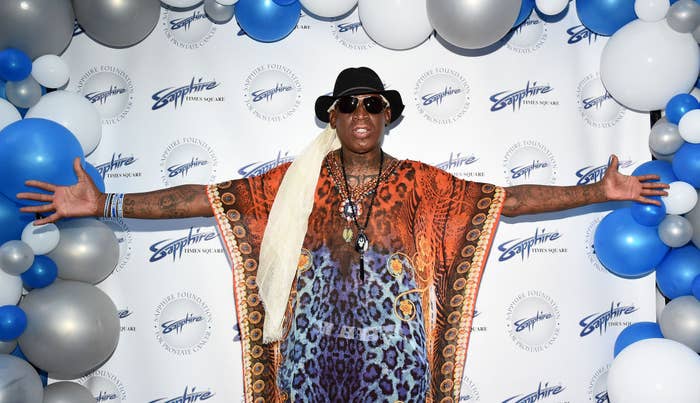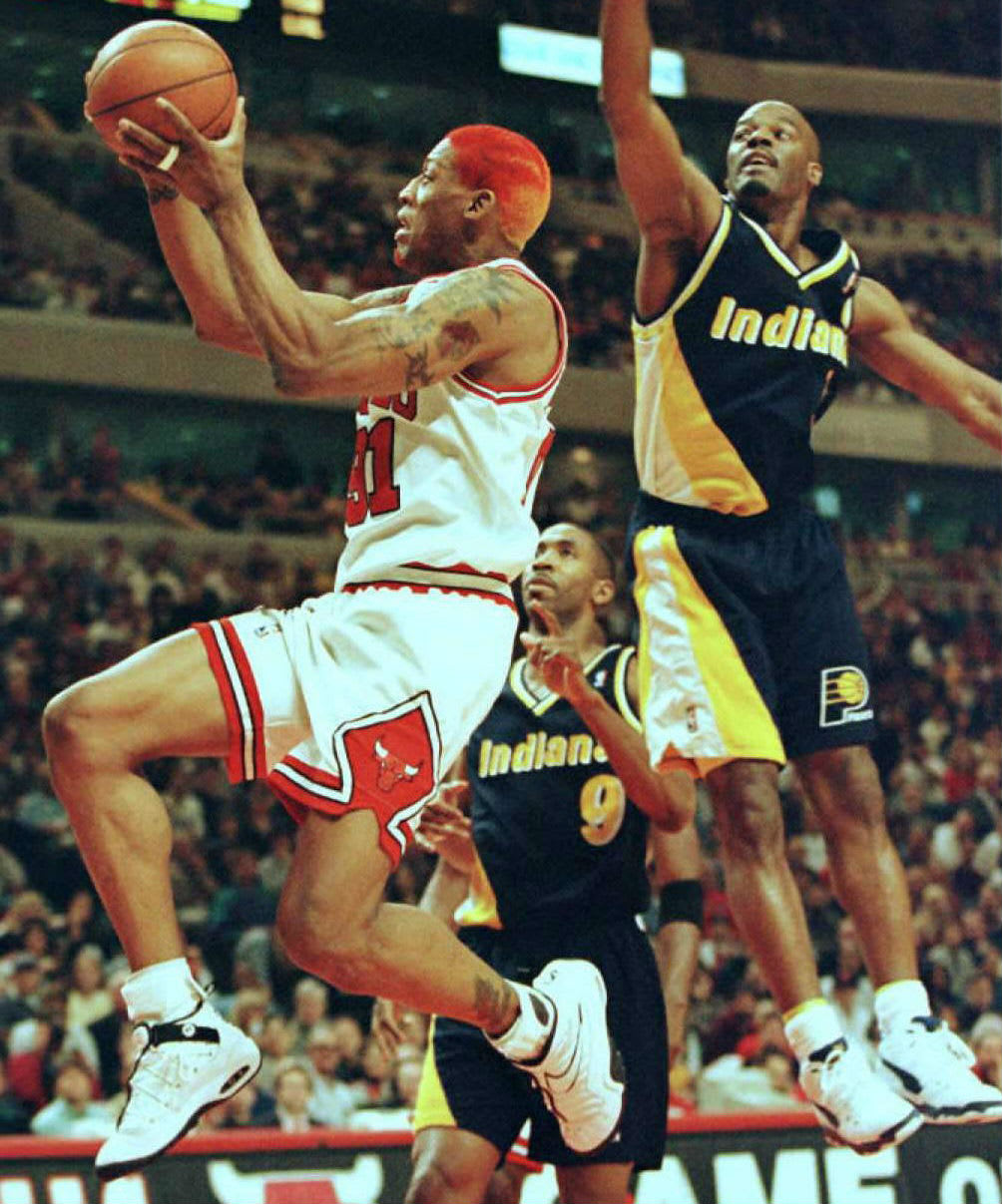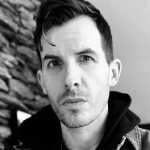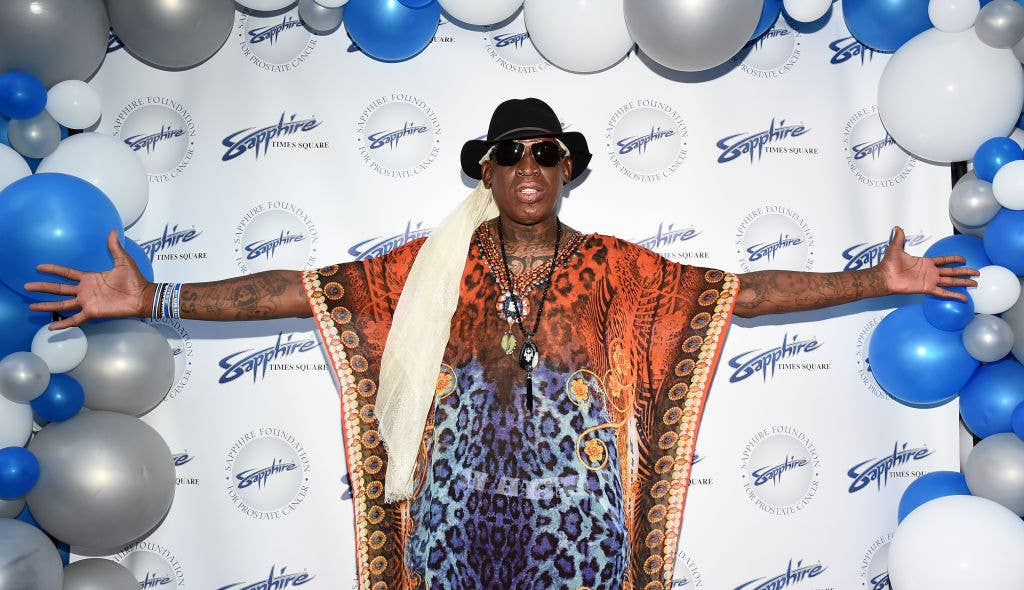
It sounds preposterous, but there was a time when Dennis Rodman might’ve been more famous than Michael Jordan in the Windy City.
From 1996-98, no athlete was worshipped the way Jordan was around Chicago as he led the Bulls to a second three-peat. But when it came to capturing headlines, titillating the masses, and blurring the lines between basketball and pop culture, nobody was on Rodman’s level. Not even Mike.
“In Chicago, Michael is a God and Scottie Pippen's Jesus. I should've been Moses,” Rodman jokes.
Rodman has lived most of his life by a different set of commandments and the good, the bad, and the ugly are dissected and discussed in the latest ESPN 30 For 30 documentary debuting Tuesday. Narrated by Jamie Foxx, Rodman: For Better or Worse is a deep dive into the life and times of one of the most famous athletes from the 90s who was as much an instigator on the court as he was an influencer off it. A Hall of Famer who earned enshrinement to the Naismith Basketball Hall of Fame in 2011 for his championships and rebounding abilities became just as synonymous with dressing in drag and partying harder than anybody else during his days with the Bulls. For those reasons, and a few others, Rodman captured the imagination and earned the attention of basketball fans and regular Joes in ways MJ never did.
“I was the opposite of Michael Jordan off the court and people loved seeing me doing these other antics and like, ‘Wow, I mean this guy's interesting,’” says Rodman. “Because back then in 1996, 7, and 8, I was pretty much like on top of the world.”
Before Rodman finally gets to see the finished product, we talked to the 58-year-old about the documentary and how he rivaled MJ’s fame, why Isiah Thomas called him a genius on the basketball court, and his unique relationship with North Korean leader Kim Jung-Un.
(This interview has been edited and condensed for clarity.)
Did you talk about stuff personally and professionally in this doc that you kind of thought that you never would get a chance to again in your life?
Well, I see it like this: sooner or later before I die I have to say something like that. To completely understand some of stuff, the things I've done, some of the things I've changed from and I try to, when I do my interviews around the world and stuff like that. A lot of people connect to me as far as being honest when I do my interviews because I'm directly forward like being emotional when I talk about myself because I'm so real like that. I can't hide anything about my life because people connect to me like that and I just felt like the fact that people want me to continue to be the individual I've been for the last 25-30 years and I've got to show them that image of me and not to portray something that I'm not.
I just knew you had to chuck, run, play defense, shoot. That was it. I didn't understand how to be a professional athlete when I came into the league in '86.
Was your time in Detroit the peak of your NBA career? Because I know in the doc others kind of describe that time as when you seemingly were the happiest and most pure of your career.
I was so green at the time. I was so happy, I was so jubilant. I was elated and stuff like that because I just wanted to please people. I wanted to be just so alive. Ready to rock, I just want to do this and that, and that, and everybody was like happy. I fed off the crowd and the people around me because I want to make people happy. That was my whole goal, pretty much. I didn't care about the money. Like I don't care, I just want to play. I didn't care. When things started to go awry in Detroit, People started to get traded, got fired, and I just wanted to rebel because I thought that this was supposed to be our family and I think they embraced it as a family in the beginning. We said in the beginning we're going to do this until we win our championship. We're going to stick together and for like four years straight, we pretty much lived together to try to win a championship. We won two, we got two championships, but we pretty much lived together. Summer, spring, winter, fall, we was all together. And when things started to go bad, I just like felt I lost my whole family. I just started to rebel and I start to just like release out and stuff like that so when they traded me to San Antonio and then all of sudden something hit me like I got to change my life, I got to change something about me because you know it's a new adventure for me.
In the doc, Isiah Thomas called you a genius on the basketball court. Why were you a genius on the basketball court?
I don't know, man. I know a lot of people have said that about me, that I knew the game so well. You know it took for me to really develop a skill to play basketball because I didn't know anything about the game. I just played the game. You know, I didn't know about the fundamentals. I didn't know anything about that, I just knew you had to chuck, run, play defense, shoot. That was it. I didn't understand how to be a professional athlete when I came into the league in '86. Isiah pretty much ingrained that in me. We was playing the Lakers, I think in '87, and Isiah came to me—someone was shooting a free throw, talking about shooting a free throw. I was at half court just standing there and he came to me and just lunged at me and hit me in my chest so hard. I said, "What the hell was that for?" He said, "This is no bullshit, Dennis, this is for real. Get your mind right. We trying to be champs." And I didn't know what to say to him. I wasn't going to fight him on the court. He just looked at me. I think that point on I got the message of it. Okay, this shit is real. This ain’t no fun and games. This is about winning a championship. I think Isiah was up there with a passion for me because he knew if he did something like that to me, I would follow instructions. I did it and I think that's why I appreciate him.
A lot of notable people participated in this doc—including Phil Jackson and Michael Jordan. Whose participation meant the most to you?
They interviewed a whole lot of people for this doc. They couldn't get Chuck [Daly], he died. They couldn't get Penny Marshall, she died. But I purposely didn’t want to see it [until the premiere]. You know, those people are going to talk about the realness of Dennis Rodman and what he brings to the table. It wasn’t the antics I did outside of basketball, it was the stuff on the court. And that means more to me than anything because once I'm on the court, I'm on the court. That's why that's my job, no matter what. I don't give a damn. I don't talk to nobody, I don't speak to nobody, I go do me and just go make sure that we win. That's my whole focus, winning, and Michael, Scottie, all those guys who participated in the doc know that was my whole mentality right there.

A bunch of people in the doc said that you idolized Michael Jordan and then when you were asked about it in the doc you laughed. So why do you laugh when people say you idolized Michael Jordan?
[Laughs] When people ask me questions about Michael Jordan, I say "Michael Jordan, come on man. This guy's the greatest basketball player on the planet.” I looked at him and Scottie Pippen and once I got on the team and watched them, their dedication, their hard work, everyday. These guys were on, on, on because they want to win. They guarded each other every day at the practice. I think the fact that I loved that mentality because that was Joe Dumars, Isiah Thomas, Bill Laimbeer, Rick Mahorn, all those guys in Detroit that remind me of those guys. But it was two guys on Chicago that like always said, "Yep, we going to do this. We are going to do this." We didn’t know we were going to be 72-10 that year, but I think that confidence that Michael Jordan and Scottie Pippen put in me, I used to look at those guys every day, man I was like, "Wow, those guys play fair. I can trust these guys. I can trust Michael Jordan, he's going to do his job. Scottie's going to do his job. I can trust you guys, I've played with you guys.”
People also said that during your time with the Bulls, you were actually more famous than Michael Jordan. Could you tangibly feel that?
[Laughs] I think that right there is a statement like that where I was saying that, too, like for a minute, I was more famous than Michael Jordan in Chicago. I was different, I was doing all kinds of unique things like going on shows dressed in drag. I wore women's clothes, I was going out to clubs, I was doing this, I was doing that. I was the opposite of Michael Jordan off the court and people loved seeing me doing these other antics and like, "Wow, I mean this guy's interesting." Because back then in 1996, 7, and 8, I was pretty much like on top of the world. In Chicago, Michael is a God and Scottie Pippen's Jesus. I should've been Moses. Like okay, great and I was Rod-Man. I was Rod-Man and like, you know, so I think that the fact that people embraced me more because I was so real and so hard working as far as like doing the most. I think they love the fact that my attitude and the way I present myself in the game. I appreciated what I was doing. I think that people really related to that, related to me like that. That's a cool statement to say, but Michael Jordan's Michael Jordan.
It's kind of funny you haven't seen the doc yet. They did spend the final few minutes of it talking about your trips to North Korea and it had people around you talking about your motivations and your reasons for your relations with the North Korean leader, Kim Jung-Un. I guess the question I have for you is that are your intentions and relations with him still largely misunderstood?
You know what's funny? I think a lot of people have grown to understand, you know, what has transpired over the last two or three years. I think people have really understood the fact that I tried to do something really cool. I try not to be in a position to be a politician and I've always tried to stress the fact that I'm a professional ballplayer. I'm trying to bring sports and trying to connect my career in that direction. In the beginning, people didn't understand that. They thought I was just going over there and that I'm real buddy buddies with him, that I would've stayed at his house, I'm going to be like his best friend and it wasn't like that. I mean the guy likes me and I like him because the fact that he didn't just do anything to me. I'm not stupid to the fact that what he does is what he does. I don't know anything about that but he treats me in a good respect, I treat him in a good respect.
There's no reason for me to go over there and start bashing him and tell him, "Wait, you're such a dickhead, you're an asshole." No. He's not like that to me. He's very nice, he's very courteous, he's very cool, and he gave me the key to his country and said, "Anytime you want, Dennis, come to my country." He said, "Wherever you are in the world, Dennis, I'm going to make sure you're okay."
Pretty much that's how he talks to me. I think that goes a long way because it gives me the assurance the fact that I can go back to America, anywhere in the world and say, "This guy's not like that.” I said, "Give him time to understand that he is going to come to the 21st century.” That's why I try to embrace people with that message and all of sudden people started to be like, "Oh, I see what he's trying to do." And then once I started to do stuff like that then all of sudden, what happened? Donald Trump went to go meet him. I'm just going to see a guy that’s a friend of mine and I'm not saying he's my best friend, but I think that he's a good person to me, I'm trying to build a relationship with that country, and that's basically what it is.
At the end of the doc, you're kind of joking about you're one of the most recognizable people on the planet and that you should be happy and the doc does a great job of documenting your ups and downs—and there are plenty of ups and plenty of downs. So I guess the final question I have for you is what makes you happy these days?
Yeah, that is funny and that's why I put myself in a category with [Albert] Einstein, I put myself with Mozart, I put myself with Steve Jobs. All the people that have been so committed in the world, the people that have been so misunderstood doing certain things that's not common to the world but then when they come to fruition, then it’s like, okay, great, wow, I see what those guys are trying to do now because it's enlightenment. I've been doing that for 20-something years now and now we like it. And now the new generation of America right now is taking over the world and now they like Dennis Rodman because they’re like, “We didn’t know you did all that.” Now you see everybody in the country and any individual that lived on this planet are trying to do things that seem unconventional to try to make something that's happening, or something happen for the world, but it's like I've done those things already and it's still going on today.
What makes me happy is I think if I could actually put myself in a position to actually throw away the ego, throw away all like the pride and stuff like that in my life, to be a better father to my kids. That's my only wish right there. I would need to put away all this other shit I got going on and just say you got to just man up, you're 58 years old now. That's what going to make me happy the rest of my life. I got to make that commitment. That's the only thing that'll make me happy before I die.

